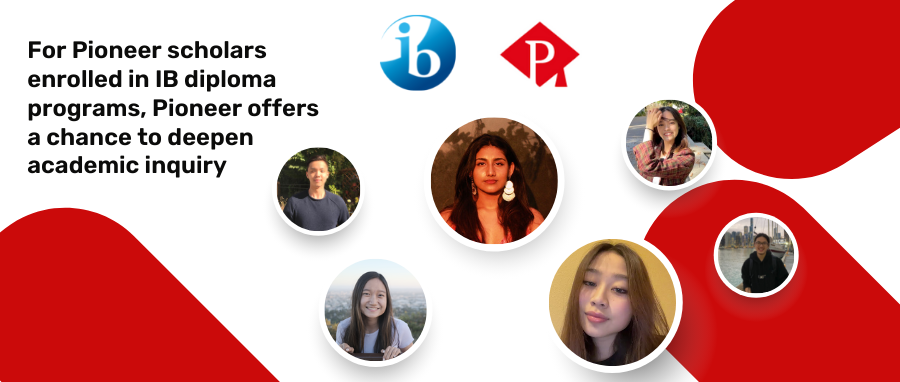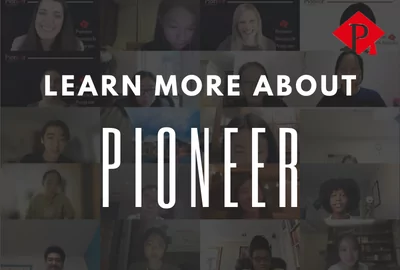Since 2012, over 4000 students from 71 countries were selected and have participated in the Pioneer research program. Pioneer scholars have diverse educational backgrounds, whether they be derived from a national curriculum or an advanced academic program such as AP, IB, or A-Levels. There is no one educational profile that is right for Pioneer, and the range of experiences Pioneer scholars bring to their cohorts enriches the research program.
Due to the intensity of the writing requirements in the IB Diploma Programme, prospective students sometimes wonder whether it is possible to balance both IB and Pioneer. Continue on to read the perspectives of Pioneer alumni who have also completed the IB Diploma Program, with focuses on differences, similarities, and how alumni balanced the two programs.
The International Baccalaureate (IB) Diploma Programme is well known as a challenging and enriching academic experience that concludes with the Extended Essay (EE). The EE is typically an independent research paper of about 4,000 words, with a topic chosen from one of the student’s six subject areas. Most IB students do their Pioneer research during the first year of the IB Diploma Program or the following summer, but some participate in Pioneer before beginning IB. In this case, scholars who complete the Pioneer Research program prior to enrolling in IB cannot use their Pioneer paper or paper topic for their EE, as that would violate IB’s policies around academic honesty. However, they may leverage the readings, resources, and techniques learned through Pioneer if their IB extended essay addresses an adjacent or overlapping topic.
Given the fact that IB already requires a lengthy research paper, it might seem redundant for IB students to do research at Pioneer. On the contrary, students testify that Pioneer serves as an excellent complement to the IB Diploma Programme. Pioneer can build on skills that students are already developing in IB while allowing them to dive even deeper into research. While combining two very rigorous programs is a challenge that might not be right for everyone, IB and Pioneer can be very compatible for driven students who want to push their abilities to the next level.
Pioneer grants students academic freedom to explore interdisciplinary topics
Many Pioneer scholars find that Pioneer offers academic freedom that is lacking in IB, particularly when it comes to interdisciplinary topics. Adam (engineering, 2019), a Pioneer scholar from China, appreciated that Pioneer allowed him to work on an interdisciplinary topic that wouldn’t have been possible in IB. “In IB, every [science subject] is its own course. They don’t bring subjects together even if it’s clear they’re related. In IB, we don’t learn calculus in physics at all because they don’t expect students to know calculus at that point. They give all these vague explanations for things that make sense if you understand calculus, but don’t make any sense if you don’t….The fact that Pioneer’s topics are very connected helped me to understand that in the real world, subjects will be combined. I really enjoyed the fact that I was able to take what I know and apply it to new situations,” he says.
Lois (United States, philosophy, 2020) who conducted research in bioethics, an interdisciplinary area that combines biology and philosophy, says that research at Pioneer has the potential to be more flexible and interdisciplinary than the IB extended essay. “I think the difference [between the IB extended essay and the Pioneer research paper] lies in the fact that for IB, you choose to write from a certain subject group, whether it’s philosophy or math or biology. A lot of times the things we research in Pioneer don’t align with a specific subject group,” she explains. When it comes to conducting research, Pioneer scholars may combine methods from other disciplines to answer a research question.
Pioneer helps students develop a “research mindset” which can prepare them for IB EE – and beyond.
The rigor of the Pioneer research program is excellent preparation for future research and writing, whether in IB or at university. Gayathri (India, history, 2020), feels that the Pioneer research paper left her extremely prepared for the IB extended essay. She explains, “I come from a very traditional Indian schooling system in which academic writing is something that’s never really taught. Your textbook is essentially your entire guide to how you write. So going into IB, I did not really have a grasp of how to go about academic writing. I was really interested in the idea that I could do research [at Pioneer], because that seemed a bit unthinkable as a high school student…. When I heard that Pioneer is not restricted to STEM but is also open to the humanities and social sciences, I was ecstatic. In IB, that kind of opportunity only exists in [the extended essay], which is quite similar to the kind of research paper we need to write for Pioneer. I knew Pioneer would prepare me for that.” At Pioneer, Gayathri says that her writing was given more individual attention than is possible in IB. Her Pioneer faculty mentor provided specific feedback and instruction when it came to the structure of her paper, most of which she has carried over to her extended essay––signposting with topic sentences, for example. Furthermore, Gayathri believes that Pioneer places a greater emphasis on proper citation and academic integrity, which has given her a different perspective on her writing and her place in a community of scholars.
Michael (China, economics, 2020), agrees that participating in Pioneer gave him a major advantage in IB because of the research skills it taught him. “Pioneer definitely helped me get into a research mindset. When my teachers would talk about gathering data and citations, it was a no-brainer for me because I went through the same thing in Pioneer. In that aspect, I was ahead of my peers. I already knew the basic framework of research. Compared to Pioneer, IB was really easy,” he says. Michael adds that while the IB extended essay is relatively straightforward and based around a rubric, the Pioneer research paper is much more open-ended and “free.”
IB EE is undeniably rigorous. Pioneer takes this challenge to the next level – so how do students develop strong time management skills when balancing the two programs together?
In addition to research and writing skills, the challenge of conducting research at Pioneer and of juggling two rigorous academic programs at once pushes students to develop strong executive functioning and time management skills. Angeline (United States, neuroscience, 2020), says that participating in IB and Pioneer helped her learn to manage her time wisely. “Writing both [the Pioneer research paper and the IB extended essay] at the same time taught me a lot about time management and being able to juggle two essays together. I think writing an IB research paper honestly really helped with my research and writing skills for my Pioneer paper and vice versa,” she says. Eleanor (China, neuroscience, 2020), says that the Pioneer Research Program fit in well with her studies and helped her improve time management and writing skills. “Writing my Pioneer research paper helped me prepare for writing in IB. I knew what to do before I started writing and how to find sources. IAs (Internal Assessments) and EEs are much shorter than the Pioneer research paper. That gave me a lot of confidence,” she says. Additionally, Eleanor notes that the two programs share an emphasis on academic curiosity, which makes them even more compatible. “I used my curiosity to learn neuroscience in Pioneer. In IB, we have to come up with our own research question to write an IA, which is driven by our own curiosity. That is the same in both programs,” she explains.
Durga (India, international relations, 2020), agrees that skills developed in Pioneer transfer to IB and vice versa. “I think that the IB and the Pioneer Research Program really supplement each other in terms of the skills you learn and knowledge you will develop,” she says. To prospective Pioneer scholars enrolled in IB, she says, “I strongly feel that as long as you are really passionate about your research concentration and are willing to put in some quality time outside of your regular schedule, this will be a fantastic experience! I enjoyed studying the IB while doing the Pioneer Research Program because I felt that the program broadened my perspectives and the way I approach new ideas and that helped me write my [extended essay] and [individual assessments].”
IB students are already used to taking on academic challenges and thinking critically and creatively. By becoming Pioneer scholars, they sharpen the skills they have already built in the IB curriculum and take them to the next level, conducting college-level research in a rigorous yet supportive environment. Pioneer is a good fit for IB students looking to challenge themselves in order to develop writing and research skills, as well as the confidence that comes from taking on an ambitious task.


 Doing research is commonplace.
Doing research is commonplace.


